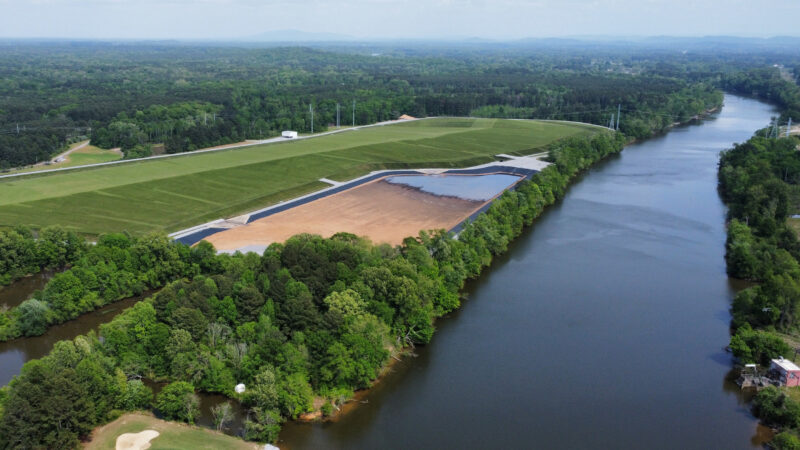Alabama Power threatened with lawsuit for contaminating groundwater with coal ash
This article originally appeared on Inside Climate News, a nonprofit, independent news organization that covers climate, energy and the environment. It is republished with permission. Sign up for their newsletter here.
By Dennis Pillion and Lee Hedgepeth, Inside Climate News
GADSDEN, Ala.—Cruising upstream on the Coosa River through downtown Gadsden, it would be easy to miss the old coal ash pond sitting on the north bank of the river.
It’s mostly hidden by trees and bushes, except for a narrow opening with an aging chain-link fence and a “no trespassing” sign. Even from the air, the green synthetic liner that covers 65 years’ worth of coal combustion residuals looks like an extension of the Twin Bridges Golf Club that borders the pond to the west.
“There are people that boat by this all the time and have no idea what it is,” Coosa Riverkeeper Justinn Overton said as the boat idled in the channel. “Because it just looks like it’s an extension off the golf course, or nothing to be concerned about. It doesn’t look like it’s the leftover waste from the coal-fired power plant.”
Alabama Power’s Gadsden Steam Plant was demolished last year after 109 years on the river, but the unlined coal ash pond remains, and, according to the Coosa Riverkeeper, continues to leech potentially harmful substances like arsenic, boron, chromium and cobalt into the groundwater.
Now, Coosa Riverkeeper has filed a formal notice of intent to sue Alabama Power over the groundwater pollution from the old pond, based on groundwater testing results that Alabama Power is required to post twice per year.
The Riverkeeper, represented by the Southern Environmental Law Center, says it will file a lawsuit under the Resource Conservation and Recovery Act (RCRA) and the U.S. Environmental Protection Agency’s Coal Combustion Residuals (CCR) Rule, which regulates coal ash disposal. Such lawsuits require a formal notice at least 60 days before filing.
“Alabama Power has zero excuses for leaving its leaking waste dump in the middle of the commercial riverfront area of Gadsden and exposing the community to this hazard,” Barry Brock, director of SELC’s Alabama office, said in a news release announcing the move. “Other utilities across the South are cleaning up unlined coal ash dumps and moving waste to safer storage away from our waterways. Alabama Power must do the same in Gadsden.”
Alabama Power did not immediately respond to multiple requests for comment by phone and email.
A test case for cover in place?
At 77 acres and 1.2 million cubic yards of coal ash, the Gadsden ash pond is much smaller than some of the other massive coal ash lagoons in Alabama. The one at Plant Barry, in Mobile County, is nearly 600 acres.
But Gadsden’s was the first coal ash pond in Alabama to fully close after the U.S. Environmental Protection Agency implemented federal coal ash disposal rules in 2015. In fact, plans for the closure were already underway before the final rule was issued.
Coal ash, or CCR, is an umbrella term that refers to several waste materials generated by the process of burning coal for electricity production. These waste materials can include fly ash, bottom ash, boiler slag and flue gas desulfurization sludge.
Often, energy utilities combine these waste materials with water and store them in ponds at or near electrical generating plants, a practice environmental groups have criticized because they risk contaminating groundwater. Currently, Alabama has nine coal ash disposal sites across the state, most of which are located near waterways.
The Gadsden ash pond was covered in 2018, but still appears to be releasing significant levels of toxins into groundwater. The Riverkeeper says that the October 2024 sampling results show arsenic at 40 times the legal standard for groundwater.
The Gadsden ash pond is also close to the city’s riverfront area, including numerous boat launches and areas where people can fish from the banks. There’s also a drinking water intake just 0.6 miles downstream from the ash pond.
Overton said it’s concerning that the pond is still contaminating groundwater at high levels years after closure.
“We’ve been asking for the same thing, over and over again, which is [for Alabama Power to] move your ash to an upland lined landfill,” Overton said. “Unfortunately, it takes litigation at times to force movement.”
For all of its coal ash lagoons, Alabama Power elected to “dewater” and cover the ponds where they are rather than excavate the ash and move it to a lined landfill. In that process, the remaining ash slurry was dewatered and compacted into a smaller footprint. A low-permeability liner was then installed on top of the slurry to keep rainwater from entering the disposal area and carrying contaminants into the environment.
Environmental advocates and concerned citizens have urged the company for a decade now to move the coal ash to lined landfills away from the rivers to prevent groundwater contamination. They are also concerned about the potential for a catastrophic incident like the one at the Tennessee Valley Authority’s Kingston, Tennessee, plant in 2007, when a dam breach sent 5.4 million cubic yards of coal ash slurry into a holding pond and then the Emory River.
In 2014, a steel sewer line under a North Carolina coal ash pond collapsed, allowing the waste material to flow into the pipe and, eventually, into the nearby Dan River, polluting the water and putting dozens of marine species in harm’s way. The disaster was among more than 160 cases of water contamination at coal ash sites that spurred adoption of the Coal Ash Rule in 2015.
The 2015 EPA coal ash rules allowed for cover in place, as long as certain conditions were met. The Alabama Department of Environmental Management signed off on the company’s cover in place plans, approving closure permits for all ash ponds in the state.
However, last year, the EPA rejected Alabama’s coal ash permitting program, saying it was “significantly less protective of people and waterways than federal law requires.”
“Under federal regulations, coal ash units cannot be closed in a way that allows coal ash to continue to spread contamination in groundwater after closure,” the EPA said, in denying Alabama’s program. “In contrast, Alabama’s permit program does not require that groundwater contamination be adequately addressed during the closure of these coal ash units.”

A 2019 report by the Environmental Integrity Project and other advocacy groups found that 91 percent of coal-fired plants still had ash landfills or waste ponds that leak highly toxic metals and chemicals such as arsenic, lead, mercury, selenium and cadmium into groundwater at dangerous levels, often threatening streams, rivers and drinking water aquifers.
“Exposure to coal ash can lead to serious health concerns like cancer if the ash isn’t managed appropriately,” then-EPA Administrator Michael S. Regan said of the federal government’s denial of Alabama’s coal ash permitting plan at the time. “Low-income and underserved communities are especially vulnerable to coal ash in waterways, groundwater, drinking water, and in the air. This is why EPA works closely with states to ensure coal ash is disposed of safely, so that water sources remain free of this pollution and communities are protected from contamination.”
An executive of Alabama Power, which owns most of the state’s CCR units, claimed at a September 2023 EPA hearing that the utility’s storage ponds are “structurally sound.” Susan Comensky, Alabama Power’s vice president of environmental affairs, told EPA officials that allowing the company to “cap” CCR waste in place, even in unlined pits, will not present significant risks to human or environmental health.
“Even today, before closure is complete, we know of no impact to any source of drinking water at or around any Alabama Power ash pond,” Comensky said at the time.

However, Alabama Power has been repeatedly fined for leaking coal ash waste into groundwater.
In 2019, ADEM fined the utility $250,000 after groundwater monitoring at a disposal site on the Coosa River in Gadsden showed elevated levels of arsenic and radium, according to regulatory documents.
In 2018, ADEM fined Alabama Power a total of $1.25 million for groundwater contamination, records show. In its order issuing the fine, the agency cited the utility’s own groundwater testing data, which showed elevated levels of arsenic, lead, selenium and beryllium.
The EPA denial notice cited Gadsden, among other coal ash ponds in Alabama, where waste ash material remains in constant contact with groundwater.
Overton said about 40 percent of the ash at Gadsden is saturated by groundwater.
“Alabama Power created this mess,” Overton said. “They shut this facility down and demolished it, but now they want to leave [the ash] here. Alabama Power claims to be a good neighbor, but I was taught that to be a good neighbor, you clean up after yourself.”
Here’s how world leaders are reacting to the US-Israel strikes on Iran
Several leaders voiced support for the operation – but most, including those who stopped short of condemning it, called for restraint moving forward.
How could the U.S. strikes in Iran affect the world’s oil supply?
Despite sanctions, Iran is one of the world's major oil producers, with much of its crude exported to China.
Why is the U.S. attacking Iran? Six things to know
The U.S. and Israel launched military strikes in Iran, targeting Khamenei and the Iranian president. "Operation Epic Fury" will be "massive and ongoing," President Trump said Saturday morning.
Sen. Tim Kaine calls on the Senate to vote on the war powers resolution
NPR's Scott Simon talks to Sen. Tim Kaine, D-Va., about the U.S. strikes on Iran.
Iran strikes were launched without approval from Congress, deeply dividing lawmakers
Top lawmakers were notified about the operation shortly before it was launched, but the White House did not seek authorization from Congress to carry out the strikes.
Political science expert weighs in on Iran’s nuclear program in light of U.S. strikes
NPR's Scott Simon speaks to Ariane Tabatabai, the Public Service Fellow at Lawfare, about U.S. attacks on Iran and how President Trump's calls for regime change might be received there.





